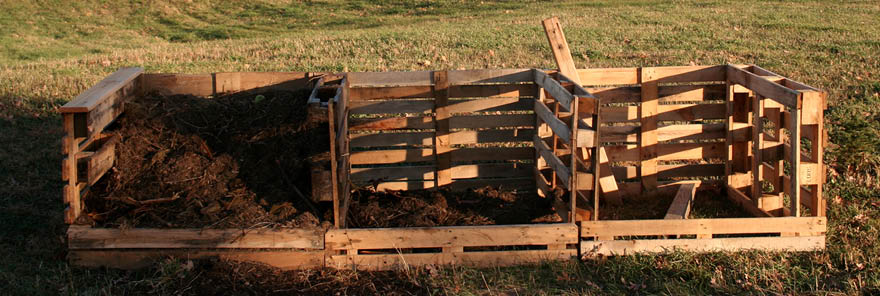One constant dilemma facing horse owners, no matter what your discipline, is manure disposal. Horses create manure continuously, and it has to go somewhere. The ubiquitous manure pile that so many barns have used over the years is, unfortunately, a less attractive and useful option as farm properties grow smaller and closer to their neighbors, and as municipalities and water management boards seek to discourage run-off into streams, rivers, and aquifers. What to do with all that manure just piling up?
Try composting!
Compost can create useful, nutritious soil amendment out of manure — truly turning a problem into a solution. Anyone can do it, whether you need a commercially-designed system for your large equestrian center or you want to build your own compost pile for your small barn.
At the end of the day, you’ll have beautiful, nutrient-rich material that is valuable to gardeners and farms — maybe you’ll even find it’s time to start growing a few veggies yourself. All you need is a compost system that allows the manure to heat up, growing microorganisms to break down the manure, while killing parasites that you don’t want in your garden.
Building Your Own Basic Compost Pile: Ideal for the horse owner with a handful of horses and a little extra space, you can build a hot-compost pile with just a few pallets or boards. Build two bins: one for making the compost and one for curing the compost. Your bins should support a manure pile about four to six feet high, and three to five feet wide. Make sure it’s a good distance from your barn, and from flammable storage — part of composting is creating temperatures of up to 140 degrees within the pile.
Once you have manure in the first bin, the decomposition begins on its own. If there’s plenty of bedding, like straw, shavings, or even hay, mixed into the manure, you don’t need to add anything to kick start the process. If it’s raw manure, such as what you pick out of your paddocks or fields, you’ll want to add some vegetation or shredded paper to start the decomposition. Maintenance involves turning the pile over with a pitchfork a few times a month, and checking the moisture level. Put on a glove and squeeze a handful of compost to check for water — you should get a few drops out of it. Too much or too little can be fixed by adding water or more dry organics like leaves.
Once the compost cools down, you can transfer it to the second bin for its curing period. This is a process that takes several months, but eventually you’ll see that the manure is breaking down and turning into a rich organic matter that you can spread on your garden, or bag up for gardeners to come and take away.
You can also avoid the labor of transferring compost from one bin to the other by building a few extra bins, so that you always have one you can add manure to while another one is busy decomposing.
We have collected examples of these on our Pinterest Board.
Compost System Solutions: D.I.Y. home-built composting might not work if you have more than a couple horses on your property, or if you are working under zoning or permitting constraints meant to protect property and groundwater. In these cases, you can turn to a colleague of ours who can develop a compost solution for your particular needs.
One such company that offers compost solutions is O2Compost. Working with an aeration system that speeds up the composting process, they create purpose-built compost systems that almost take the labor out of composting. No turning and no emissions makes aeration composting a smarter choice for horse owners. Many of our clients choose this option and build a facility like Three Sons Ranch.
No matter how many horses you own, dealing with manure responsibly is always going to be a challenge. Composting manure is the best way to turn something no one wants in their backyard, into something that everyone wants for their pastures and gardens.



We just got new neighbors who have put a horse in an electrical wire fence, just about 7 feet from our property. This is in the front yard, and they don’t clean up the poop. Our well is within 15 feet of the area where the horse is enclosed. I would say the horse doesn’t even have one tenth of an acre for grazing. Can all of the horse waste including him peeing, contaminate our well? Please help, we need advice on Pennsylvania’s laws concerning keeping domestic horses in your front yard. Thank you
We are sorry to read that you find yourself in this complex situation. Please note that we are not able to give you legal advice on this issue. However, you may be able to search for publicly available information based on your local jurisdiction. For example, The Philadelphia Code section 10-108.2 on “Private Keeping of Horses” mentions “at least one quarter of an acre” as the minimum amount of open space required per horse. The website also mentions the horse owner’s responsibility in ensuring manure is cleared “at least once every 24 hrs in leakproof containers […] at least 50 feet from any body of water”. We recommend contacting a licensed lawyer and/or getting in touch with the Animal Control Agency in Pennsylvania, who may be able to provide you with additional information and guidance. Source: https://codelibrary.amlegal.com/codes/philadelphia/latest/philadelphia_pa/0-0-0-198583